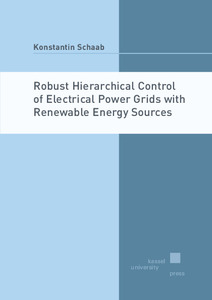| dc.date.accessioned | 2023-06-14T09:57:27Z | |
| dc.date.available | 2023-06-14T09:57:27Z | |
| dc.date.issued | 2018 | |
| dc.identifier | doi:10.19211/KUP9783737604994 | |
| dc.identifier.isbn | 978-3-7376-0499-4 (e-book) | |
| dc.identifier.uri | urn:nbn:de:0002-404996 | |
| dc.identifier.uri | http://hdl.handle.net/123456789/14819 | |
| dc.description | Zugleich: Dissertation, Universität Kassel, 2018 | |
| dc.language.iso | eng | |
| dc.publisher | kassel university press | |
| dc.rights | Urheberrechtlich geschützt | |
| dc.rights.uri | https://rightsstatements.org/page/InC/1.0/ | |
| dc.subject.ddc | 620 | |
| dc.title | Robust Hierarchical Control of Electrical Power Grids with Renewable Energy Sources | eng |
| dc.type | Buch | |
| dcterms.abstract | The growing integration of renewable energy sources into power grids increases the fluctuations of quantities such as active and reactive powers, voltages, and frequencies - these fluctuations may eventually lead to instabilities, possibly cursing to shutdown and potentially reduced availability of electrical power. The standard approach to stabilizing control of electrical power grids is to start from the nominal operation mode, linearize the dynamics around this mode, and to design linear standard controllers locally for each generating component. This procedure may become insufficient for larger shares of renewables, since the fluctuations can lead to considerable deviations from nominal operation thus rendering the use of controllers designed for linearized models inadequate. Furthermore, the controllers of the involved energy sources are typically designed separately and without considering the stability of the complete grid. This work proposes a multi-level controller approach for power systems, which ensures robustness against changing operating points and fluctuating power sources. On the lower level, the system is decomposed into smaller subsystems, each modeled as a linear parameter-varying system (LPVS), i.e. the LPVS representations of synchronous generators, the wind turbines and photovoltaic systems are proposed. With this technique, the fluctuations and nonlinearities of the components are mapped exactly into variations of the parameters of the LPVS. The varying parameters also account for fluctuations of the connected grid components. The LPV technique allows a decentralized synthesis of locally robust controllers stabilizing for considered ranges of parameters. The synthesis is realized by semi-definite programming. Existing techniques for LPV controller synthesis are tailored to decentralized control of power grids and extended to the handling of input constraints in this work. Since the same modeling and controller technique is applied to the three types of grid components, a truly unified controller approach is realized, ensuring the stabilization of the whole grid. The multi-objective approach allows the simultaneous control of the rotor angle stability, as well as the (local) voltage control, while damping grid oscillations. | eng |
| dcterms.accessRights | open access | |
| dcterms.creator | Schaab, Konstantin | |
| dcterms.dateAccepted | 2018-01-26 | |
| dcterms.extent | vi, 140 Seiten | |
| dc.contributor.corporatename | Kassel, Universität Kassel, Fachbereich Elektrotechnik / Informatik | |
| dc.contributor.referee | Stursberg, Olaf (Prof. Dr.-Ing.) | |
| dc.contributor.referee | Erlich, István (Prof. Dr.-Ing.) | |
| dc.publisher.place | Kassel | |
| dc.relation.isbn | 978-3-7376-0498-7 (print) | |
| dc.subject.swd | Elektrizitätsversorgungsnetz | ger |
| dc.subject.swd | Dezentrale Elektrizitätserzeugung | ger |
| dc.subject.swd | Erneuerbare Energien | ger |
| dc.subject.swd | Netzstabilität <Elektrische Energietechnik> | ger |
| dc.subject.swd | Parametervariable Regelung | ger |
| dc.subject.swd | Lineares System | ger |
| dc.subject.swd | Spannungsregelung | ger |
| dc.subject.swd | Hierarchische Regelung | ger |
| dc.subject.swd | Robuste Regelung | ger |
| dc.subject.swd | Modellprädiktive Regelung | ger |
| dc.type.version | publishedVersion | |
| kup.iskup | true | |
| kup.price | 39,00 | |
| kup.subject | Naturwissenschaft, Technik, Informatik, Medizin | |
| kup.typ | Dissertation | |
| kup.institution | FB 16 Elektrotechnik / Informatik | |
| ubks.nodoigen | true | |
| ubks.epflicht | true | |


